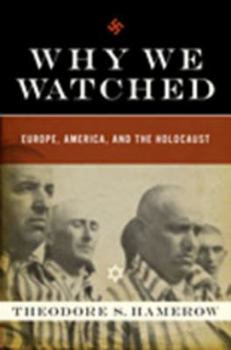Why We Watched: Europe, America, and the Holocaust
Select Format
Select Condition 
Book Overview
The Allies stood by and watched Nazi Germany imprison and then murder six million Jews during World War II. How could the unthinkable have been allowed to happen? Theodore Hamerow reveals in the pages... This description may be from another edition of this product.
Format:Hardcover
Language:English
ISBN:039306462X
ISBN13:9780393064629
Release Date:August 2008
Publisher:W. W. Norton & Company
Length:544 Pages
Weight:1.45 lbs.
Dimensions:1.6" x 6.5" x 9.2"
Customer Reviews
3 ratings
Enlightening And Sad
Published by Thriftbooks.com User , 15 years ago
I'm almost finished with this book. It is very well researched and I find it enlightening yet sad. While the U.S. and Europe dithered over the "Jewish Question," Hitler and his henchmen proceeded with their final solution. I believe the Allies' inaction played right into Hitler's hands. Even today when a particular group gets singled out for persecution, there is much hand wringing and nothing more. The book can be dry, but Hamerow is not out to entertain the reader. I visited the Holocaust Memorial Museum today and there too the inaction of world leaders is discussed along with the U.S. reaction (or lack thereof). My visit was emotionally intense, but it put Hamerow's argument all together for me. I recommend this book and also a trip to the museum if one is ever out in DC.
the right story but the wrong author
Published by Thriftbooks.com User , 15 years ago
It is good to have the facts made clear: Hitler did every Christian and ex-Christian country's dirty work in killing the Jews. Unfortunately this particular historian, though he knows how badly history is usually written by academics, is incapable of writing a book the general public will read.
An Important Contribution to Holocaust Discussion
Published by Thriftbooks.com User , 16 years ago
Theodore S. Hamerow, professor emeritus of history at the University of Wisconsin, Madison, offers us, in "Why We Watched: Europe, America, and the Holocaust," a painstakingly researched examination of why, during World War II, the western allies - the United States, England, and France,behaved as they did. They simply stood by and allowed Nazi Germany, under Hitler, to implement its plans for the "final solution" to the "Jewish problem--" mass murder. (Even Canada, later, during the Vietnam War, so hospitable to American draft dodgers, refused to accept any substantial number of European Jews as immigrants.) The Holocaust still haunts us more than half a century later, and with good reason. It's hard for us to understand why the allies, all of whom knew the murderous extent of Hitler's "final solution," allowed the Nazis to annihilate European Jewry. They might well have stopped the killing. Before the war, they might have taken in many more refugees, saving them from the hell to come. Even during the war, they might have taken in many more refugees; or they could have bombed the railroads to the concentration camps, the supply lines to the camps, or the camps themselves, and disrupted the cruel efficiency of the Third Reich. However, they did not. They persisted in describing the Nazis as murdering many of their subject peoples, rather than focusing on their fanatical plans for the Jews within their sway. And they continued to insist that the best way to save lives was to bend all military efforts to the effort to win the overall war as quickly as possible. Hamerow sets forth the thesis that each of the allied nations was struggling with its own version of the "Jewish Question:" each was conscious of the Antisemitism within its own population that had been exacerbated by the prewar Great Depression of the 1930's. Hamerow's figures make it clear that the Antisemitism in the four countries -- England, France, Canada and the U.S.-- was not nearly as virulent or violent as that found in Hitler's Germany, nor in the rest of Central and Eastern European countries - all of it worsened by the Depression. (In fact, Hamerow's research gives us several of the Eastern European countries that, before the war, seemed voluntarily to be matching Hitler's Germany in passing Antisemitic legislation.)However, the Antisemitism of the population of the Western allies was serious enough to force allied political and military leaders to follow what Hamerow characterizes as "a statecraft of carefully calibrated compassion:" to make their opposition to what was happening known, but not to take specific action against it. Aside from its subject matter, Hamerow's book is not easy reading; though well-written, and prodigiously researched, it is rather long and repetitive. There's an important omission, as well. In his consideration of why the world finally became aware of, and focused on the Holocaust, in the 1960s, forty years after its occurrence, the aut






